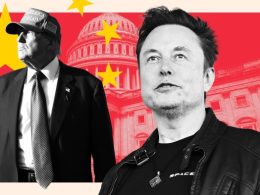Unlock the Editor’s Digest for free
Roula Khalaf, Editor of the FT, selects her favourite stories in this weekly newsletter.
Ultimately, all antitrust enforcement is political. It depends on the will of the government of the day to prosecute violations and pursue sanctions to the full.
That has left uncertainty over the latest development in the US case against Google. The trustbusters at the Department of Justice went for broke this week, asking for a sweeping set of sanctions against the company. Whether this becomes a turning point for the company is now as much a political as a legal question.
Forcing Google to shed its Chrome browser is the most eye-catching part of the proposed sanctions. But the DoJ is also pressing for a web of business restrictions that would tie Google down and subject it to a decade of outside monitoring. The proposal is slightly less dramatic than the wider break-up the DoJ had said it was considering pursuing. However, it contains a far more detailed set of restrictions that would block one of Google’s central strategies: Using its array of products and services to funnel users to its search engine.
It is hard to argue with the DoJ’s decision to go for such a sweeping set of sanctions. Simply banning the practices that helped give Google its dominant position — the exclusive search distribution contracts that have been ruled illegal — wouldn’t undo the harm. The market has already tipped decisively in its favour. Besides opening new avenues for would-be rivals, regulators want to make sure Google can’t use its search monopoly to gain control of an AI market that is in the throes of formation.
Two self-reinforcing factors have made it particularly hard for others to make a dent in the search market. The large volume of searches on Google generate a mass of data that gives it an edge in terms of quality. Also, Google’s dominance means it can use advertising to monetise searches at a higher rate than rivals. If the DoJ succeeds in picking these apart, it will have reverberations across the internet. Much of the tech industry revolves around the search giant, dependent on its software and fed by its search traffic and advertising dollars.
Forcing Google to shed Chrome would cut off one important source of search traffic. The DoJ stopped short of pressing for the separation of Android as well, though it suggested this should be a fallback option if Google fails to open the mobile operating system fully to other search engines. Cutting one or both of these software products off from Google’s search engine would rob it of an important source of traffic. Chrome’s new owners would have every incentive to recreate the tie with Google through an arms length commercial deal. If that route was blocked, it would probably fall into the arms of Microsoft’s Bing — a huge gift to one of Google’s chief rivals. A newcomer like OpenAI might also like to buy Chrome, though the cost could well be prohibitive.
Microsoft and OpenAI are also likely to be among the main beneficiaries from another key part of the DoJ’s proposed remedy, which would prevent Google from maintaining its search engine tie with Apple in any way, shape or form. The DoJ’s efforts to throttle Google’s flow of search traffic also reach into its internal product strategy, If the court agrees, Google would be prevented from “bundling” its search engine with important products.
These changes would certainly hamper Google. But it is still an open question whether any of this would be enough to support a new generation of start-ups that hope to use new generative AI services to break into Google’s search market. Besides lacking Google’s extensive distribution, they also lack its mass of user data and vast advertising machine.
The DoJ answer is to force Google to share much of its data — something that the company has warned could undermine the privacy of its users. And, to jump-start competition, it would also require Google to offer ten-year syndication deals to let others distribute its search results. To even out some of the financial imbalance, rivals could also get full access to Google’s advertising for a year.
This is not the first time that a landmark antitrust case against a big tech company has spanned administrations in Washington. In 2000, a court ordered the break-up of Microsoft — though the software company partially won on appeal, overturning the sanction while losing its effort to have the antitrust ruling reversed. A new administration in Washington chose to settle the case before the court battle could be renewed. Whether Google can expect a similar route out of legal jeopardy will be the first big test of the new Trump administration’s attitude to Big Tech.
richard.waters@ft.com
Source link









